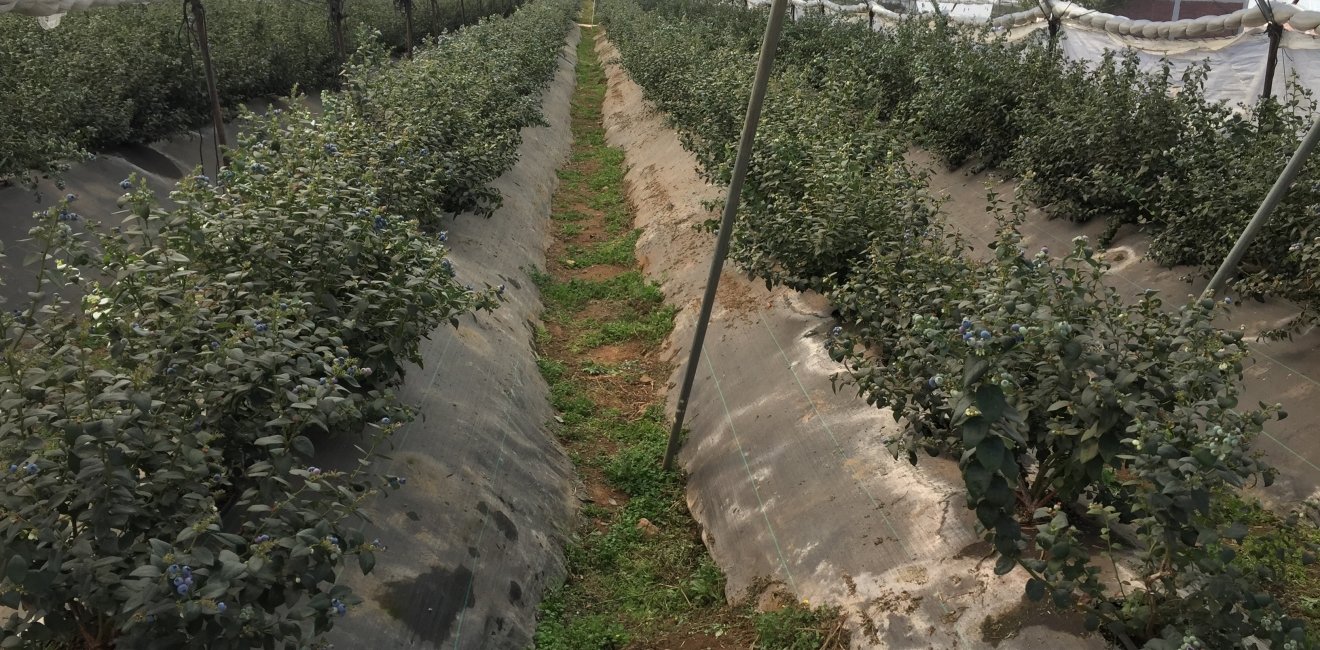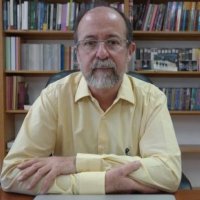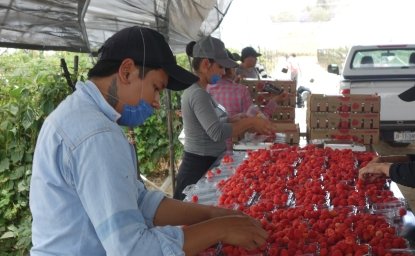Case Study: Martín
This case study is a part of the Mexico Institute's project "Farm Labor and Mexico’s Export Produce Industry."
This case study is a part of the Mexico Institute's project "Farm Labor and Mexico’s Export Produce Industry."

Martín is around 50 years of age: “Maybe I’m 49 or something like that.” He is from Tala, and lives with his second wife and his father, who is over 80. Martín is a supervisor in the Las Hormigas field of the company Berries Paradise. His father and mother are from San Pedro Apulco, close to Nochistlán, Zacatecas, and came to Tala to work. “Hunger brought them here,” he says. When they arrived, his mother was pregnant with his older brother. “They got here and had to rent a place and live wherever they could, because when they got here, there were no houses in Tala.”
When they arrived, Martín’s father began work on the sugar plantation; at that time “they didn’t burn the cane, they cut it raw. . . . It was harder work then, not like it is now . . . when they set fire to it all and then cut it.” While she was pregnant with her first child, Martín’s mother worked in the sugar cane with her husband; after her first child and subsequent pregnancies she could no longer work.
Martín cannot remember the exact age at which he started to work in the cane with his father; rather than mention a specific age, he says: “Since I could hold a machete or whatever they gave us to cut [he moves his hands as if he were cutting sugar cane], alright. That’s the age I started at. . . .” Guessing, he says “maybe I was there helping in the cane at six or seven, because the older ones didn’t want to help anymore, so now it was the younger ones.” His father’s only work was in the cane in Tala, and “my father worked his whole life for one boss. There he got his pension, there he retired. But ever since I can remember, he started . . . he started to hang around the bosses, and of course he always wanted us to work there with the same bosses he had.” Martín remembers that his father was paid very little; he realized this because his father’s pay was only enough to buy the house where they live now, but not enough to buy food, or for him and his brothers to go to school. “I said no—how could I work where my father worked? To follow him and be the same? I won’t even be able to afford to eat, because I saw at home that we couldn’t afford to eat.” They ate beans and tortillas every day. “When my father had money he bought a little piece of meat, and it was rare that we ate it. We just had a little of the grease that dripped off, yes, to get the flavor of the meat.” For 15 years they lived on a ranch belonging to his father’s boss on the outskirts of Tala.
Growing up, Martín began doing errands for neighbors when he was not “helping” his father in the cane fields, in order to save some money to buy shoes and a knapsack for school. “Beginning with school there were battles with my parents because there wasn’t any money even for a knapsack or shoes. I went barefoot to school. I was more ashamed of my shoes with holes than going barefoot. It was better to go barefoot. My knapsacks were these [he grabs the plastic bag containing his lunch].”
Martín organized his days into working on the sugar plantation, doing errands, and school. He woke up at 5 a.m. to go work with his father in the cane fields. At 11 a.m. he returned home with his father to run errands before going to school: “to the store, to buy tortillas, to the mill . . . wherever, to earn a few centavos. And that’s what I did growing up.”
Martín’s father did not learn how to cut sugar cane until he came to Tala, because in Zacatecas he had grown corn and chiles. His father taught him to work the fields: to clear the ground with a hoe, with a machete, by hand, and to irrigate. “That’s how he taught all of us brothers, working in the fields. He always brought us there, even if we didn’t like it, sometimes hitting us, ‘Come on!’. . . Sometimes we didn’t want to go with him anymore, and [he’d say] ‘What do you mean? Come on, you have to get up.’ You had to go.” Since he started working with his father, Martín has helped him cut the cane. “He said to us, ‘You know what? You have to do this furrow and you have to keep up with me.’ And you had to hurry, because if you didn’t, my father was like, ‘You’re not listening to me?’ . . . and boom, you got whacked with a piece of cane.”
Martín always thought he would work, not study: “I wanted to work, earn some money, because I saw what it was like at home. I said ‘No, I don’t want to be here studying.’ He was expelled from the third grade for throwing rocks at the teacher. He lost a year; he was not allowed to return until the beginning of the following school year. “I said to my mom, ‘Don’t send me back. I don’t want to study; I want . . . to work.’ ” The year he did not go to school, Martín worked with his father in the sugar cane, and his father received his wages. “They paid him. . . . Actually, that’s why I was thinking a lot about working for myself. Because I saw my brothers, who were already earning their own money working in the cane.”
He was expelled again from the sixth grade for not paying attention. “I just spent my time thinking about work. And for that, just two or three years more. . . . I was 10 or 11, and I wanted to work because my brother-in-law makes fireworks.” First his older brothers went to make fireworks with his brother-in-law, and then he followed. “Before, they were underground; they worked at home. Before, there were no permits like there are now, where they work away from populated places.”
Martín’s mother asked him just to finish elementary school and they he could go work wherever he wanted. “I worked hard to finish that year. Then they kissed me goodbye and it was over. I left for the gunpowder.” At first he made the cardboard molds for fireworks and filled tubes with clay. “So that was my job when I started, but when I saw that and saw what the others were being paid, I wanted to do what they were doing in order to make more money.” He combined the work with cutting sugar cane: the cane in the morning and the fireworks in the afternoons or evenings.
When he was 13, Martín started cutting cane by himself. They paid him by the week and he gave all his wages to his mother. “I didn’t tell her ‘Take this.’ I said, ‘Look what I earned. Now you give me what you think is mine.’ She wasn’t like my father. If I had said that to my father, he would have taken it all . . . but my mother no. She said, ‘Look, you earned a lot, take some to buy clothes, buy what you need.’ ”
Martín’s father has never approved of his work making fireworks. He is 90 years old and still doesn’t like that Martín, his sister, and his nephew do this work; he would rather they work in the fields or in a factory. Martín was earning money both from cutting sugar cane and from making fireworks. This meant he was earning more than his father, which made his father furious. Their arguments began when Martín turned 15 and shortly thereafter started to drink. “My friends said, ‘Have a beer,’ or ‘Have a cigarette, you’ve earned them.’ But my father gave me nothing but beatings when I started to do that. They were beatings that . . . my mother had to treat the wounds on my back.” His father beat him with a rope or with the fan belt from a truck or a tractor.
Because Martín drank so much, they sent him to a rehabilitation center for a year, during which time he did not work. “They had us do stuff there, anything . . . go out with a cup and ask for money, things like that.” He stopped drinking, and has not had a drink for 20 years now.
Martín returned to his parents’ home on his mother’s birthday, a day before she went to the hospital for uterine cervical cancer. No one in her family knew she was sick until the cancer had spread; she got no treatment from the time she was diagnosed until just before she died. She was the only one who knew she was sick; although she had social security health care, they never had medication, and she did not want to ask her husband for money. “Maybe she was afraid to ask my father for money. . . . He was really difficult with money. She told him what she spent almost every day.” After a month in the hospital, his mother died, at the age of 51.
Martín continued to live in the house with his father, including after he married his first wife. He continued to combine the paid jobs of cutting cane and making fireworks, and complemented them with activities for his own consumption: hunting, fishing, and growing corn. During one of the breaks in the sugar cane season, Martín and one of his friends saw an advertisement from the company Berries Paradise for workers to clear fields and construct a cranberry greenhouse. Because it was the off season for sugar cane, they arrived to find a long line of people looking for work. They were given picks and shovels and began clearing brush.
Martín has been at the company’s Las Hormigas field for four years, since it began production. Octavio, the field supervisor, trained him. Martín likes the work with cranberries, especially for the wages he gets for the harvest. He became Octavio’s right-hand man, so that when Octavio was transferred to a much larger field in Cuxpala, he recommended Martín to the bosses to take his place. Martín has had a contract for two years now as field supervisor at Las Hormigas. He earns 8000 pesos a month, “4000 less than a harvester” and much less than what he sometimes earned cutting sugar cane. But he stays at the job because of the confidence Octavio and the owners showed in him, putting him in charge of Las Hormigas. He does not rule out returning to the sugar cane, where he says it is possible to earn up to 8000 pesos a week, “although the work is harder—but if you like to work it doesn’t seem like much.”


The Mexico Institute seeks to improve understanding, communication, and cooperation between Mexico and the United States by promoting original research, encouraging public discussion, and proposing policy options for enhancing the bilateral relationship. A binational Advisory Board, chaired by Luis Téllez and Earl Anthony Wayne, oversees the work of the Mexico Institute. Read more



